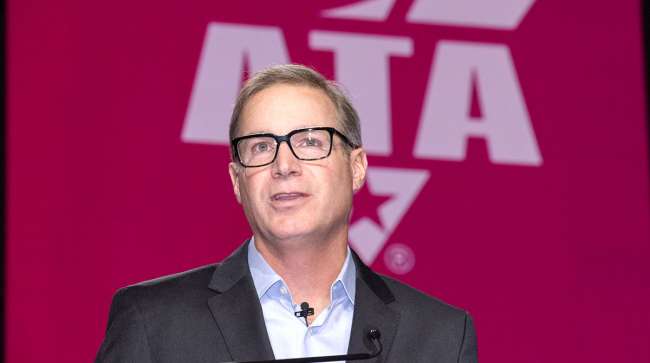Senior Reporter
ATA’s Chris Spear: 2022 Has Brought Trucking Major Victories

[Stay on top of transportation news: Get TTNews in your inbox.]
American Trucking Associations President Chris Spear said he is excited to talk about the victories the federation has achieved over the past year, but he’s equally energized about taking on the issues facing it in the months ahead.
“We’ve probably had more tier one wins this year than ever before,” Spear said during an interview with Transport Topics in advance of ATA’s Management Conference & Exhibition, set for Oct. 22-25 in San Diego. Specifically, he mentioned a victory in the U.S. Supreme Court that blocked enactment of a COVID-19 vaccine mandate that would have applied to trucking companies, as well as a federal court victory that ruled a truck-only tolling plan in Rhode Island was unconstitutional.
Spear noted that the vaccine mandate case, “was something that [ATA] brought the lawsuit and led the fight on.” In Rhode Island, Spear said the judge, “issued such a well-reasoned decision that really sent a signal, not to just Rhode Island, but to other states as well.” Spear added, “I think these issues really illustrate why we fight.”
We're less than 3 weeks away from #ATAmce22 in San Diego, the premier event for #trucking leaders. Connect with 3,000+ industry execs, while you learn the latest updates in trucking. Plus, celebrate at the banquet featuring a performance by @walkerhayes! https://t.co/XdEHl3DZsM pic.twitter.com/ZpruPVHmc5 — American Trucking (@TRUCKINGdotORG) October 4, 2022
ATA also stayed close to lawmakers crafting what became the $1.2 trillion Infrastructure and Jobs Act, which Spear said will bring significant resources to help repair and upgrade the nation’s infrastructure. President Joe Biden signed the bill into law nearly a year ago.
Included in the legislation was the DRIVE Safe Act, which directs the Department of Transportation to develop regulations to implement an apprenticeship program for licensed commercial motor vehicle drivers under the age of 21. ATA estimates the industry is short around 80,000 drivers.
Spear believes in getting young people interested in trucking earlier, and also working with the federal government and private sector to recruit and develop a trucking workforce that will propel the industry over the long term.
“We had the registered apprenticeship program get done,” he said of the DRIVE Safe Act’s inclusion in the infrastructure bill. Plus, ATA was on hand when President Joe Biden hosted stakeholders at a White House ceremony celebrating the bill’s passage, with trucking, “highlighted on the South Lawn again with the president,” he said.
He also noted industry interest. “More than 100 companies signed up for the 90-day challenge apprenticeship program, administered by the White House, and the Department of Transportation and Department of Labor,” he said. “Other groups, including the U.S. Chamber of Commerce, set up their own programs to recruit military veterans into the trucking industry.”
However, challenges on a slate of still-pending issues remain.
Want more news? Listen to today's daily briefing above or go here for more info
New York has become the second state — after California — to commit to stop the sale of fossil fuel-powered vehicles in the state by 2035. Supporters insist this effort will lower greenhouse gas emissions and reduce the effects of climate change, but Spear believes that the industry should lead the charge on cleaner vehicles. He noted that trucking is spearheading emissions-reduction improvements for diesel trucks, and stressed that technical innovations — based on years of research by equipment-makers and others — will do a better job of putting cleaner vehicles on the road than government-imposed mandates.
“Trucks today are much cleaner,” Spear said. “Sixty-six trucks emit what one truck emitted in 1988. We got there because of innovation within our industry, starting with the OEMs and the development of equipment that can withstand the conditions they are put into, and running in all of those conditions. We are working with the EPA on national emission standards and we have a seat at the table on all of these discussions.”
On the state level, Spear said ATA and state associations are making progress on lawsuit reform and “nuclear verdicts,” which usually involve a jury award of more than $10 million for a plaintiff suing a trucking company.
Spear said the industry is working to convince state lawmakers to put monetary caps on punitive damages, along with other courtroom changes that, in Spear’s words, would “level the playing field” before juries.
“We started this effort in 2019. We’ve already got six states adopting legislation,” he said. “I have 11 more in the pipeline right now that are teeing up legislation, starting with Florida. I’m very optimistic that at least half of those are going to have legislation introduced within the next few months and that we’re going to be successful.”


